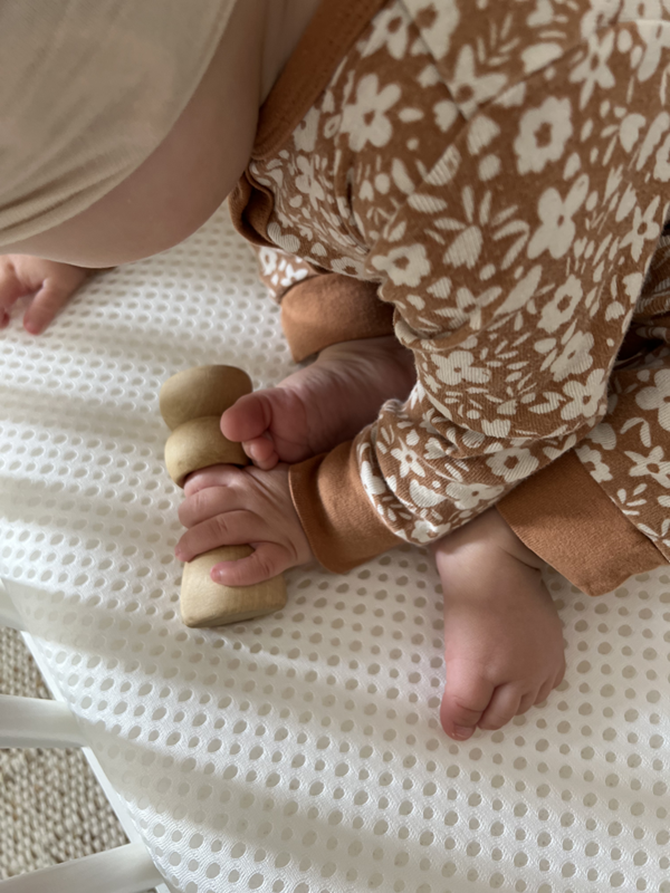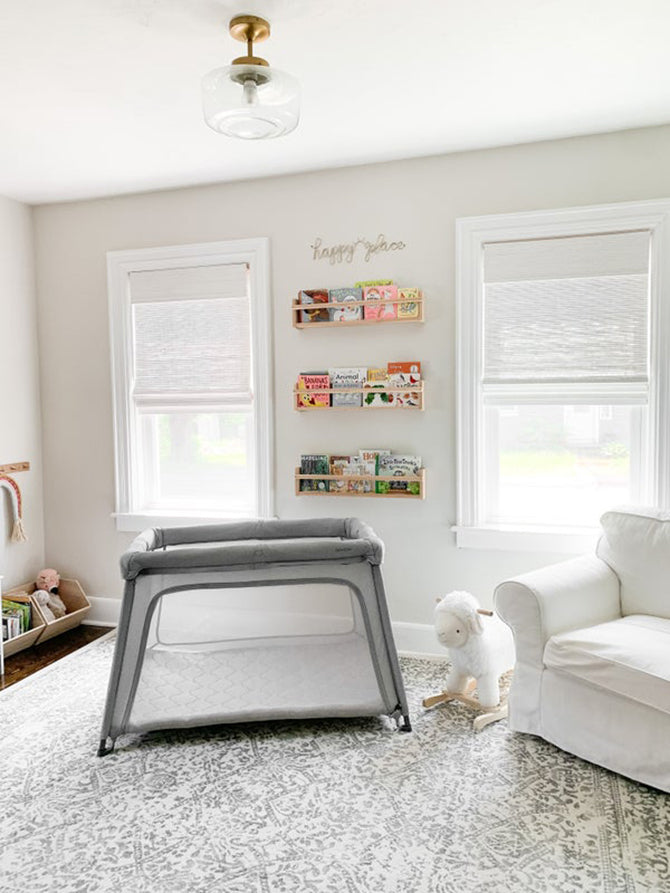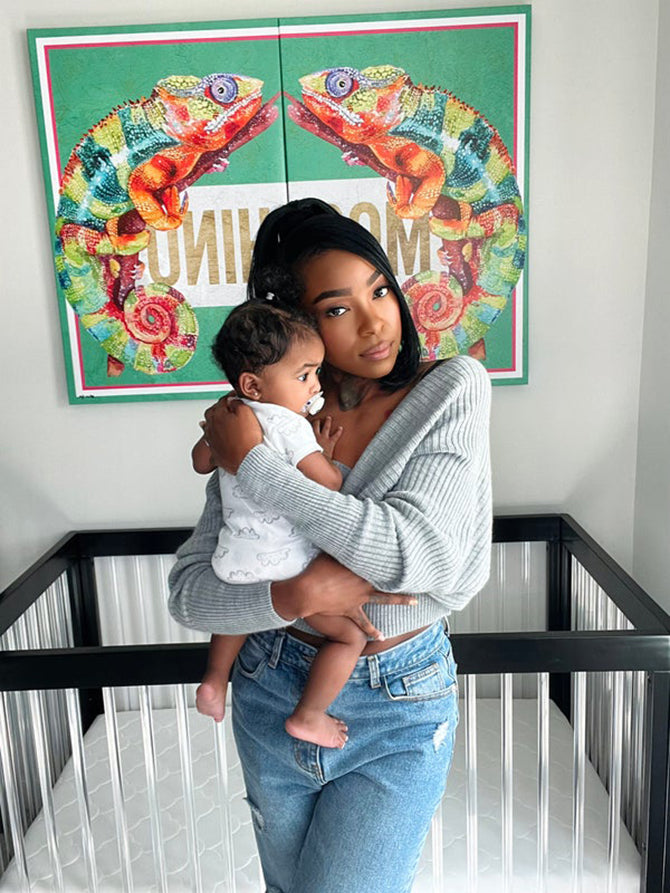9-Month-Old Milestones: Your Baby's Development at 9 Months

Babies grow and develop at an astonishing pace. One day they’re newborns, and then, poof — they’re rolling over and babbling away. As a parent, you may wonder what your little one will do next. Let’s explore the 9-month-old milestones so you know what to watch for.
But first, let’s look at the concept of developmental milestones in general so you better understand why they’re used to track growth.
Table of contents
- What are developmental milestones?
- Key 9-month-old milestones
- How to help your baby grow
- What if my baby doesn’t meet the 9-month-old milestones?
What are developmental milestones?
Developmental milestones are skills or abilities most children have mastered by a certain age. You can track your baby’s progress with these markers to get an overall sense of how they’re doing compared to other babies their age.
This can help you identify potential delays early, which is crucial. It allows interventions to start as soon as possible, giving your child the best chance to reach their full potential.
When looking at milestones, remember that each baby is unique and develops at their own pace. Your little one may be ahead in some areas and behind in others, and that’s perfectly normal.
So, if your baby hasn’t met all the 9-month-old milestones below, don’t panic!
Instead, keep track of their progress, continue working with them to support their development, and consult our pediatrician if you have concerns.
Key 9-month-old milestones
Milestones are sorted into four categories: social/emotional, language, cognitive, and physical. Here’s a look at what most 9-month-olds are doing in each area.
Social/Emotional
The social/emotional category focuses on how your baby interacts with others and expresses their feelings.
You can expect your little one to:
- Use different facial expressions
- Look at you when you call their name
- Show signs of enjoyment when playing simple games like peek-a-boo
- Be shy around people they don’t know well (they may cry or become clingy)
- Cry or reach for you when you leave
Language
While your baby isn’t yet saying words, they are learning that different actions and sounds get your attention. This early form of communication builds a framework for future language development.
Your baby is likely:
- Babbling with different sounds (b, m, and p are commonly used at this age)
- Using their arms to ask to be picked up
Cognitive

Developmental milestones in this category relate to how your child learns and thinks. They can also demonstrate their problem-solving skills.
Babies often:
- Look for an object they dropped
- Hold an item in each hand and bang them together
Physical
Your baby is gaining more control over their body. They’re working on fine and gross motor skills at this age. Fine motor skills involve smaller, more precise movements, while gross motor skills refer to larger movements. Both are important.
Physical milestones to watch for include:
- Independently getting to a sitting position
- Sitting without support
- Transferring objects from one hand to another
- Using their fingers as “rakes” to pull food or other things closer
How to help your baby grow
You are your child’s first teacher, and you can encourage their development through simple, intentional interactions. Here are some fun ways to help your baby grow.
Play simple games.
While it’ll be years before your little one is ready for games like Monopoly, they’re at the perfect age for games like peek-a-boo.
To play, cover your face with a light blanket and say “peek-a-boo” as you reveal yourself. Then, cover your baby’s face and repeat the phrase when you pull the blanket off.
After a turn or two, your baby will likely reward you with some grins or giggles. They may also start trying to take the blanket off to get to the “peek-a-boo” part faster.
Here are some other baby-friendly games to play:
- Copycat: Spend a few minutes copying your baby’s actions and sounds.
- Treasure hunt: Let your baby see you put a blanket on top of their favorite toy and encourage them to find it.
- Dump the muffin tin: Place a toy or ball into each spot on a muffin tin and let your baby try to take them out.
Intentionally unplug.
Smartphones are so integral to our lives that it can be hard to put them down. But when it’s playtime, intentionally leave your phone in another room.
You’ll be less distracted, and your baby will enjoy seeing your eyes on them.
Sing together.
Your voice is music in your baby’s ears. And even if you think you “can’t sing,” your baby loves hearing you more than any famous musician.
Go ahead and belt out some tunes for them. They’ll love it so much they might even laugh or squeal to ask for an encore.
To get more song time into your day, you can:
- Greet your little one with a morning melody
- Sing a diaper-changing song every time your little one needs to be changed
- Make up a song with your baby’s name in it
- Alternate between high and low-pitched voices
- Sing songs with different tempos
- Put on your favorite tunes and sing along (bonus points if you dance!)
Read books.

It’s never too early to foster a love of reading. Sharing a book can boost your baby’s language development and create a memorable bonding experience.
To make reading time even more special, try one of these suggestions:
- Use different voices for each character in the book.
- Let your baby touch and explore the pictures.
- Tell a story based on the pictures instead of reading the words.
- Cuddle while you read.
Implement a bedtime routine.
A bedtime routine can work wonders for your baby’s overall development. When done consistently, they’ll begin associating your routine with winding down, making bedtime easier on you both.
When creating a bedtime routine, don’t overcomplicate it. Keep it simple and consistent.
Here are a few activities you could include:
- A quick bath before changing into pajamas
- Snuggling while you read a book together
- Dimming the lights and rocking during the final feed of the day
Narrate your day.
Another great way to encourage your baby’s language development is by narrating your day. Simply talk about what you’re doing and why you’re doing it.
This lets your little one hear new words and learn more about their environment. For example:
- “Now we’re going to make breakfast. We must put this bread in the toaster and wait for it to pop up.”
- “Let’s go for a walk! We’ll put on our shoes and jacket and grab the stroller from the closet.”
- “Grandma is coming over for dinner tonight. She wants to see how big you’ve grown since the last time she was here. I will quickly pick up the living room before she arrives.”
Be encouraging.
Let your little one know that you’re their biggest fan through words of encouragement. Praise them for their effort, even if they didn’t quite get it right.
Hearing your cheers can give them the confidence they need to try again.
What if your baby doesn’t meet the 9-month-old milestones?

Despite your (and your baby’s) best efforts, they may not meet all these milestones at exactly 9 months. Most of the time, that’s OK! They’re simply developing at their own pace.
However, for some babies, missing milestones can indicate a developmental delay. If you’re concerned about your little one’s development, here are a few things you can do.
Watch for red flags.
By this age, you should notice progress in all the developmental categories above. If your baby seems significantly behind in one or more areas, it may be a sign they need extra help.
Keep an eye out for these other red flags:
- Not looking at objects or putting them into their mouth
- Not responding to their own name
- Predominantly using only one hand or one side of their body to crawl
- Not making vowel sounds when babbling
If you notice any of these, it’s time to schedule an appointment with their pediatrician. They can perform further evaluations and refer your baby to a specialist if necessary.
Reevaluate the sleep schedule.
Your baby grows while they sleep. If they’re not getting enough rest, it could negatively affect their development.
Nine-month-olds need 12-15 hours of sleep each day. If your baby doesn’t sleep that long, try these tips:
- Create a safe sleep environment with a comfortable mattress from Newton Baby.
- Keep their nursery at the right temperature.
- Use a white noise machine to help them drift off.
You may be amazed at how much your child learns after a good night of rest!
Grow, baby, grow!

Navigating your child’s first year is a mix of excitement, challenges, and countless learning moments — for both of you. As you eagerly await the mastery of the 9-month-old milestones, remember that childhood is a journey, not a race.
Observe and support your baby as they develop at their own pace. With love, patience, and a comfortable mattress, they’ll reach these milestones in no time!
And Newton Baby will be here to support you every step of the way. Our blog offers plenty of practical parenting tips, and we produce high-quality baby products to help your little one thrive.